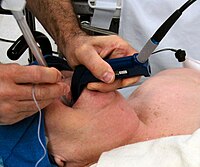
Photo from wikipedia
AIM The AIRWAYS-2 cluster randomised controlled trial compared the i-gel supraglottic airway device (SGA) with tracheal intubation (TI) as the first advanced airway management (AAM) strategy used by Emergency Medical… Click to show full abstract
AIM The AIRWAYS-2 cluster randomised controlled trial compared the i-gel supraglottic airway device (SGA) with tracheal intubation (TI) as the first advanced airway management (AAM) strategy used by Emergency Medical Service clinicians (paramedics) treating adult patients with non-traumatic out-of-hospital cardiac arrest (OHCA). It showed no difference between the two groups in the primary outcome of modified Rankin Scale (mRS) score at 30 days/hospital discharge. This paper reports outcomes to 6 months. METHODS Paramedics from four ambulance services in England were randomised 1:1 to use an i-gel SGA (759 paramedics) or TI (764 paramedics) as their initial approach to AAM. Adults who had a non-traumatic OHCA and were attended by a participating paramedic were enrolled automatically under a waiver of consent. Survivors were invited to complete questionnaires at three and six months after OHCA. Outcomes were analysed using regression methods. RESULTS 767/9296 (8.3%) enrolled patients survived to 30 days/hospital discharge and 317/767 survivors (41.3%) consented and were followed-up to six months. No significant differences were found between the two treatment groups in the primary outcome measure (mRS score: 3 months: odds ratio (OR) for good recovery (i-gel/TI, OR) 0.89, 95% CI 0.69-1.14; 6 months OR 0.91, 95% CI 0.71-1.16). EQ-5D-5L scores were also similar between groups and sensitivity analyses did not alter the findings. CONCLUSION There were no statistically significant differences between the TI and i-gel groups at three and six months. We therefore conclude that the initially reported finding of no significant difference between groups at 30 days/hospital discharge was sustained when the period of follow-up was extended to six months.
Journal Title: Resuscitation
Year Published: 2020
Link to full text (if available)
Share on Social Media: Sign Up to like & get
recommendations!